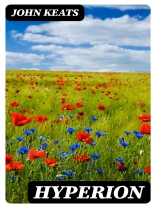In 'Hyperion, ’ John Keats delves into the profound themes of myth, creation, and the nature of suffering. Written in a rich and vivid blank verse, this unfinished epic poem draws upon ancient Greek mythology, particularly the story of the Titan Hyperion who embodies light and knowledge. Keats’s language is laden with sensuous imagery and philosophical undertones, reflecting the Romantic era’s fascination with both nature and the human condition. The poem juxtaposes the celestial and the terrestrial, exploring the dichotomy between human limitations and divine aspirations, while offering a meditation on the role of the artist in a changing world. John Keats, born in 1795, was a prominent figure of the English Romantic movement, whose personal struggles with mortality and the overwhelming beauty of life fueled his poetic vision. His own experiences of loss, love, and the constant quest for meaning resonate through the text, revealing the vulnerabilities that led him to contemplate the eternal truths of existence through mythological lens. Keats’s deep admiration for classical literature and philosophy shaped 'Hyperion’ as he sought to articulate the interplay between the sublime and the transient. 'Hyperion’ is a must-read for anyone captivated by the interplay of art and existential reflection. Keats’s exploration of the human spirit grappling with the divine invites readers to contemplate their own journeys towards understanding. With its lyrical beauty and philosophical depth, this poem stands as a testament to Keats’s genius and offers a transformative experience for those seeking insight into the nature of creation and the essence of being.
O autorze
John Keats, born on October 31, 1795, in London, England, is one of the most revered English Romantic poets. His poetic legacy, though produced in a remarkably short life span—he died at the tender age of 25—is profound. His poetry is characterized by sensual imagery and a profound use of classical mythology, and he is regarded as a master of the sonnet form. Though Keats’ early works were not well-received, his later poems such as 'Hyperion, ’ a Miltonic blank verse epic, have since cemented his place in the literary canon. 'Hyperion’ remains a testament to Keats’ intricate use of language and his exploration of themes such as the struggle and transcendence of the human spirit. Despite his work receiving mixed criticism during his lifetime, Keats’ posthumous influence on poets and the wider literary culture cannot be understated. Unfortunately, his career was cut short by tuberculosis, which claimed his life on February 23, 1821, in Rome. Keats’ letters and poems continue to be studied and admired for their emotional depth, mastery of form, and philosophical richness. His contribution to the second generation of Romantic poets remains exemplary, and his works, including 'Ode to a Nightingale, ’ 'Ode on a Grecian Urn, ’ and 'To Autumn, ’ are widely celebrated for their lyrical beauty and insight into the human condition.












